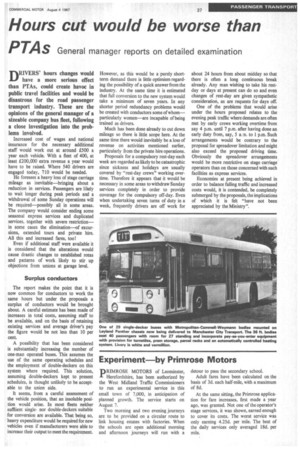Hours cut would be worse than
Page 39

If you've noticed an error in this article please click here to report it so we can fix it.
PTAs General manager reports on detailed examination DRIVERS' hours changes would have a more serious effect than PTAs, could create havoc in public travel facilities and would be disastrous for the road passenger transport industry. These are the opinions of the general manager of a sizeable company bus fleet, following a close investigation into the prob
lems involved.
Increased cost of wages and national insurance for the necessary additional staff would work out at around £500 a year each vehicle. With a fleet of 400, at least £200,000 extra revenue a year would have to be raised. Where 540 drivers are engaged today, 710 would be needed.
He foresees a heavy loss of stage carriage mileage as inevitable—bringing about a reduction in services. Passengers are likely to wait longer during peak periods and a withdrawal of some Sunday operations will be required—possibly all in some areas. The company would consider ending some seasonal express services and duplicated services, together with severe restriction— in some cases the elimination—of excursions, extended tours and private hire. All this and increased fares, too!
Even if additional staff were available it is considered that the alterations would cause drastic changes to established rotas and patterns of work likely to stir up objections from unions at garage level.
Surplus conductors The report makes the point that it is now common for conductors to work the same hours but under the proposals a surplus of conductors would be brought about. A careful estimate has been made of increases in total costs, assuming staff to be available, and on the basis of retaining existing services and average driver's pay the figure would be not less than 10 per cent.
A possibility that has been considered is substantially increasing the number of one-man operated buses. This assumes the use of the same operating schedules and the employment of double-deckers on this system where required. This solution, assuming double-deckers kept to present schedules, is thought unlikely to be acceptable to the union side.
It seems, from a careful assessment of the vehicle position, that an insoluble position would arise. In most fleets neither suffiient singlenor double-deckers suitable for conversion are available. That being so, heavy expenditure would be required for new vehicles even if manufacturers were able to increase their output to meet the requirement. However, as this would be a purely shortterm demand there is little optimism regarding the possibility of a quick answer from the industry. At the same time it is estimated that full conversion to the new system would take a minimum of seven years. In any shorter period redundancy problems would be created with conductors some of whom— particularly women—are incapable of being trained as drivers.
Much has been done already to cut down mileage so there is little scope here. At the same time there would inevitably be a loss of revenue on activities mentioned earlier, particularly from the private hire operations.
Proposals for a compulsory rest-day each week are regarded as likely to be catastrophic since sickness and holidays are usually covered by "rest-day crews" working overtime. Therefore it appears that it would be necessary in some areas to withdraw Sunday services completely in order to provide coverage for the compulsory off-day. Even when undertaking seven turns of duty in a week, frequently drivers are off work for about 24 hours from about midday so that there is often a long continuous break already. Any man wishing to take his restday or days at present can do so and even changes of rest-day are given sympathetic consideration, as are requests for days off.
One of the problems that would arise under the hours proposed relates to the evening peak traffic where demands are often met by early crews working overtime from say 4 p.m. until 7 p.m. after having done an early duty from, say, 5 a. ii. to 1 p.m. Such arrangements would be contrary to the proposal for spreadover limitation and might also exceed the proposed driving time. Obviously the spreadover arrangements would be more restrictive on stage carriage operators than on those concerned with such facilities as express services.
Economies at present being achieved in order to balance falling traffic and increased costs would, it is contended, be completely submerged by the proposals, the implications of which it is felt "have not been appreciated by the Ministry".












































































































